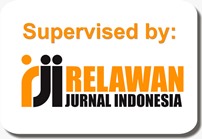THE IMPACT OF RELIGIOSITY AS MODERATOR ON THE RELATIONSHIP BETWEEN ENTREPRENEURIAL ORIENTATION, MARKET ORIENTATION AND THE PERFORMANCE OF SMEs
Abstract
The purpose of this study was to examine the impact of religiosity as a moderator on the relationship between entrepreneurial orientation, market orientation, and the performance of small and medium-sized enterprises (SMEs). The population in this study was all managers or owners of SMEs in Padang city. The sampling technique used purposive sampling with 257 samples as a sample size. The findings displayed that entrepreneurial orientation and market orientation had a positive and significant effect on the performance of SMEs. Religiosity did not affect the performance of SMEs. However, it strengthened the relationship between entrepreneurial orientation, market orientation, and the performance of SMEs.
Full Text:
PDFReferences
Adam, N. A., & Alarifi, G. (2021). Innovation practices for the survival of small and medium enterprises (SMEs) in the COVID-19 times: the role of external support. Journal of Innovation and Entrepreneurship, 10(1). https://doi.org/10.1186/s13731-021-00156-6
Alvarez-Torres, F. J., Lopez-Torres, G. C., & Schiuma, G. (2019). Linking entrepreneurial orientation to SMEs’ performance: Implications for entrepreneurship universities. Management Decision, 57(12), 3364–3386. https://doi.org/10.1108/MD-11-2018-1234
Ancok, D., & Suroso, F. N. (2011). Islamic psychology (XI). Pustaka Pelajar.
Bal, Y., & Kökalan, Ö. (2021). The Moderating Effect of Religiosity on the Relationship Between Burnout and Job Satisfaction. Frontiers in Psychology, 12(October), 1–8. https://doi.org/10.3389/fpsyg.2021.750493
Cuevas-Vargas, H., Parga-Montoya, N., & Fernández-Escobedo, R. (2019). Effects of Entrepreneurial Orientation on Business Performance: The Mediating Role of Customer Satisfaction—A Formative–Reflective Model Analysis. SAGE Open, 9(2). https://doi.org/10.1177/2158244019859088
Darmanto, W., Sri, F. X., & Sulistyani, L. (2018). Marketing orientation strategy and SMEs performance. Deepublish.
Deshpande, R., & Farley, J. U. (2004). Organizational Culture, Market Orientation, and Firm Performance: An International Research Odyssey. International Journal of Research in Marketing, 21(1), 3–22.
Hair, J. F., Black, W. C., Babin, B. J., & Anderson, R. E. (2014). Multivariate Data Analysis: A Global Perspective (7th ed.). New Jersey: Pearson Education.
Hendra, Hery Winoto, & Melitina, T. (2022). competitive advantage effect of market orientation and service innovation on marketing performance mediated by. Pressacademia, 2(3), 351–360. https://doi.org/10.17261/pressacademia.2017.761
Hunjra, A. I., Boubaker, S., Arunachalam, M., & Mehmood, A. (2021). How does CSR mediate the relationship between culture, religiosity, and firm performance? Finance Research Letters, 39(C).
Irfani, A. S., Aryani, F., Mukri, C., & Fujian, L. (2017). Analysis of religiosity and responsibility of SMEs loan repayment. Journal of Business and Management, 19(9), 49–58.
Julian, C. C., Mohamad, O., Ahmed, Z. U., & Sefnedi, S. (2014). The market orientation-performance relationship: The empirical link in export ventures. Thunderbird International Business Review. https://doi.org/10.1002/tie.21598
Kiyabo, K., & Isaga, N. (2020). Entrepreneurial orientation, competitive advantage, and SMEs’ performance: application of firm growth and personal wealth measures. Journal of Innovation and Entrepreneurship, 9(1). https://doi.org/10.1186/s13731-020-00123-7
Kohli, A. K., & Jaworski, B. J. (1990). Market Orientation: The Construct, Research Propositions, and Managerial Implications. Journal of Marketing, 54(2), 1–18.
Memon, Y. J., Azhar, S. M., Haque, R., & Bhutto, N. A. (2020). Religiosity as a moderator between the theory of planned behavior and halal purchase intention. Journal of Islamic Marketing, 11(6), 1821–1836. https://doi.org/10.1108/JIMA-01-2019-0006
Narver, J. ., & Slater, S. . (1990). The effect of a Market Orientation on Business Profitability. Journal of Marketing, 54(4), 20–35.
Nopeanti, V., Tarjo, T., & Haryadi, B. (2020). Religiosity Moderation on the Effect of Whistleblowing Intention and Fraud Tendency. Asia Pacific Fraud Journal, 5(2), 266. https://doi.org/10.21532/apfjournal.v5i2.169
Purwaningsih, R., & Kusuma, P. D. (2015). Analysis of factors affecting the performance of Small and Medium Enterprises (SMEs) with the Structural Equation Modeling Method (Case study of SMEs based on the Semarang City Creative Industry). Proceedings SNST Fakultas Teknik, 1(1).
Rofiaty, R., Aisjah, S., & Susilowati, C. (2022). The effect of entrepreneurship orientation and flexibility toward adaptive innovation and improved firm performance. BISMA (Bisnis Dan Manajemen), 15(1), 96–118. https://doi.org/10.26740/bisma.v15n1.p96-118
Sakib, M. N., Rabbani, M. R., Hawaldar, I. T., Jabber, M. A., Hossain, J., & Sahabuddin, M. (2022). Entrepreneurial Competencies and SMEs’ Performance in a Developing Economy. Sustainability (Switzerland), 14(20). https://doi.org/10.3390/su142013643
Sefnedi. (2019). Impact of service quality, customer satisfaction, and switching costs on customer loyalty. E-Jurnal Apresiasi Ekonomi, 7(1), 1–8. https://doi.org/10.13106/JAFEB.2020.VOL7.NO8.395
Sefnedi, Dwi, F. P., & Farah, T. (2023). The Effect of Psychological Empowerment and HR Practices on Job Satisfaction: The Role of Employee Engagement as Mediator. International Journal of Business Management and Economic Review, 6(1), 2581–4664.
Sefnedi, S. (2017). the Market Orientation and Performance Relationship: the Empirical Link in Private Universities. Jurnal Manajemen Dan Kewirausahaan, 19(1), 19–39. https://doi.org/10.9744/jmk.19.1.28-37
Sefnedi, Sukma, T., & Yadewani, D. (2022). The Impact of Market Orientation and Entrepreneurial Orientation on SME’s Marketing Performance. International Journal of Indonesia Business Review, 1(1), 12–20. https://ideas.repec.org/p/hal/journl/hal-03760514.html
Sekaran, U., & Bougie, R. (2020). Research Methods for Business: A Skill Building Approach (8th ed. (Asia Edition). Wiley.
Wesarat, P. O., Majid, A. H., Shari, M. Y., Khaidir, A., & Susanto, P. (2018). Mediating effect of job satisfaction on the relationship between work-life balance and job performance among academics: Data screening. International Journal of Engineering & Technology, 7(3), 214–226.
DOI: https://doi.org/10.31846/jae.v11i2.621
Refbacks
- There are currently no refbacks.

This work is licensed under a Creative Commons Attribution-NonCommercial-NoDerivatives 4.0 International License.
e-Jurnal Apresiasi Ekonnomi Indexed by:












